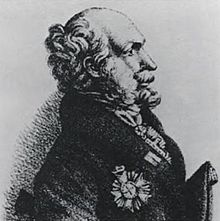Georg Anton Schäffer
Georg Anton Schäffer (born January 20, 1779 in Münnerstadt , † 1836 in Brazil ), also known as Georg Anton von Schäffer , Jorge Antônio von Schäffer or rarely as Yegor Nikolajewitsch or Egor Antonowitsch Sheffer , was a German doctor and adventurer.
In the service of the Russian-American trading company , Schäffer tried in vain from 1815 to 1817, without the consent of the Russian government, to take possession of Kauaʻi and Niʻihau , the northernmost inhabited islands of Hawaii , for the company.
From 1822 to 1828 Schäffer was a commissioner of the Brazilian Empire and recruited thousands of mostly German emigrants from Hamburg and Bremen as colonists and mercenaries for the move to Brazil .
Life
Georg Anton Aloysius Schäffer was born as the son of a distillery owner in Münnerstadt, Lower Franconia . He studied medicine at the University of Göttingen from 1801 to 1803 . From 1808 Schäffer worked as a military doctor in Moscow. During the invasion of Napoleon in Russia (1812), he was of his childhood friend Franz Leppich for the bombs airship project recruited. In 1813 he went on board the ship Suvorov as a ship's doctor . After differences of opinion with the captain, Schäffer was asked to leave the ship in Novo-Arkhangelsk (Sitka) . The main administrator of the Russian-American trading company, Alexander Baranow , then placed Schäffer in the service of the trading company.
The Schäffer affair
In 1815, at the instigation of Baranow, Schäffer sailed to Hawaii to reclaim goods for the Russian-American trading company that had been stolen from one of his wrecked ships. The king of the island of Kaua'i , Kaumualii (1778? -1824), who was latently dependent on the Hawaiian King Kamehameha , confirmed Schäffer in his belief that the Russian-American trading company could at least settle permanently on some islands. The Russian fort was built during this time. In 1816 Schäffer signed a protectorate treaty on the Hawaiian island of Kaua'i with the Hawaiian sub-king Kaumualii on behalf of the Russian crown . In his ignorance, however, Schäffer underestimated the balance of power on the islands and the readiness of the Russian government to intervene in his favor. The subsequently lost support of Kaumualiis and in particular the agitation of American and British merchants forced Schäffer to surrender and leave Hawaii in July 1817. The company suffered a loss of more than 200,000 rubles . The company sued Schäffer for the damage, but after a dubious legal stalemate , it was found easier to let him return to Germany. The Russian-American trading company pursued the plans for the Hawaii Project behind the scenes until 1821 .
Schäffer and German immigration in Brazil
The German immigration in Brazil culminated in the 19th and 20th centuries. For many Germans , the social problems in Europe and the prospect of prosperity were reasons for emigrating to Brazil.
In 1818 Schäffer organized a trip across the Atlantic to Brazil for a group of 20 Germans who wanted to leave their homeland. This Schäffer Group was granted land in Bahia . The Frankenthal settlement was founded there, the first German settlement in Brazil.
In September 1822, the Brazilian government sent Schäffer back to Germany to recruit colonists and mercenaries . He came in early 1823 as an agent for the Emperor Dom Pedro I of Brazil. Schäffer set up an advertising office in Hamburg in 1823 , visited the Hanseatic cities as well as Frankfurt am Main and numerous German courts. This mission was the beginning of the first great wave of German emigration to Brazil. Especially people from Mecklenburg , the Hunsrück , the northern and western parts of today's Saarland and the western Palatinate were recruited by Schäffer's agents. Overall, Schäffer are assigned to more than 5,000 Germans who emigrated to Brazil over the next five years (1824–1828).
The Schäffer-Germans formed the core of the first foreign units of the emerging Brazilian army : after landing in Brazil, many unmarried men were confronted with compulsory military service, which Schäffer had not mentioned in the advertising contracts for immigration, since the recruitment of soldiers was officially prohibited .
Schäffer's unorthodox sense of reality in Brazil went wrong twice. When Schäffer returned to Brazil in 1827, he asked the emperor to allow him a lifestyle like that of a margrave . Emperor Dom Pedro refused and only gave him a monetary bonus. In 1829, Schäffer requested another favor, this time his appointment as ambassador to Brazil. That too was denied.
Web links
- Literature by and about Georg Anton Schäffer in the bibliographic database WorldCat
Individual evidence
- ↑ Johann Jakob von Tschudi , Reisen durch Süd America, unaltered reprint of the original edition Leipzig, FA Brockhaus, 1866–1869, 5 vols., Stuttgart: FA Brockhaus, here: vol. III, pp. 199–200. states that Schäffer died in Brazil in 1836.
- ↑ http://www.auswanderung-rlp.de/auswanderung-nach-brasilien/19-jahrhund/werbebuero-dr-georg-anton-von-schaeffer-und-der-beginn-der-brasilienauswanderung.html
- ↑ http://www.kriegsreisen.de/imperialismus/dompedro.htm For Dom Pedro. Export from Europe's poor houses and prisons
- ↑ http://www.auswanderung-rlp.de/auswanderung-nach-brasilien/19-jahrhund/werbebuero-dr-georg-anton-von-schaeffer-und-der-beginn-der-brasilienauswanderung.html
- ↑ http://www.auswanderermuseum.de/deutsch/inhalt_02_003_000.htm Goals of emigration - Brazil
| personal data | |
|---|---|
| SURNAME | Schäffer, Georg Anton |
| ALTERNATIVE NAMES | Schäffer, Georg Anton Ritter von |
| BRIEF DESCRIPTION | German doctor in the service of the Russian-American trade company |
| DATE OF BIRTH | January 20, 1779 |
| PLACE OF BIRTH | Münnerstadt |
| DATE OF DEATH | 1836 |
| Place of death | Brazil |
